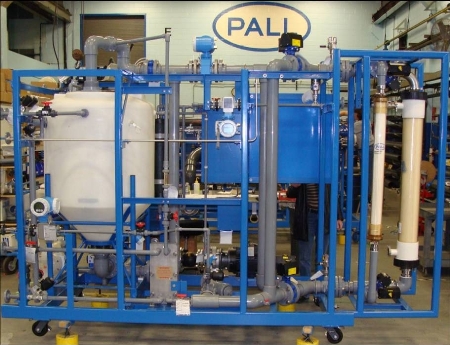Driven by the demand for alternatives to fossil fuels and the challenge to mitigate carbon emissions, algae biomass industry executives around the world are striving to develop and commercialize large-scale algae production. A main hurdle for this is the dewatering step required by many processes after harvesting the biomass. One way to achieve efficient and complete harvest is to employ scalable membrane separation technologies for concentrating the algae after harvesting from the growing environment.
 Pall's ASCF technology utilizes membranes that will not foul when processing algae. (Photo: Business Wire)
Pall's ASCF technology utilizes membranes that will not foul when processing algae. (Photo: Business Wire)
At three upcoming conferences, Doug DiLillo, global industrial biotechnology lead at Pall Corporation, will discuss the latest membrane technologies focusing on dewatering. Mr. DiLillo will present at the following conferences: Algae Commercialisation 2012, Nov. 27-28, in London; International Algae Congress, Dec. 4-5, in the Netherlands; and Algae Technology Europe, Dec. 5-7, in Belgium.
Algal biofuel is produced from algae and is an alternative to fossil fuel. Algal biofuel, like fossil fuel, releases CO2 when burnt. Unlike fossil fuel however, the CO2 is taken out of the atmosphere by the growing algae. The success of the algal biomass industry is dependent on a number of factors: the ability to scale to commercial production; the development of renewable and sustainable biomass that doesn’t compete with resources used in food production; and the emergence of efficient extraction or conversion technologies. A low-energy means of concentrating the dilute algae that is harvested from the growing environment is a particularly critical requirement for efficient dewatering of the biomass.
“The need for a scalable low-energy dewatering technology is repeatedly identified as an obstacle for the industry,” said Mr. DiLillo. “Pall’s membrane-based algae separation and concentration filter (ASCF) technology offers a solution to this need and also enables 100-percent algae biomass harvest with water and nutrient recycling.”
Pall’s ASCF technology utilizes proprietary hollow fiber membranes with outstanding regeneration capabilities. The robust fibers coupled with unique system designs developed by Pall ensure consistent performance and reliability that can be scaled up for commercial installations. The membranes will not foul while processing the algae.
Doug DiLillo joined Pall in 1995 and has held various business development roles in Pall’s Fuels & Chemicals group. In his current role, Doug leads a global effort dedicated to developing separation solutions that will help enable the success of emerging methods for the production of bio-based fuels and chemicals. He has over 25 years of experience in applying separations technologies for challenging processes.